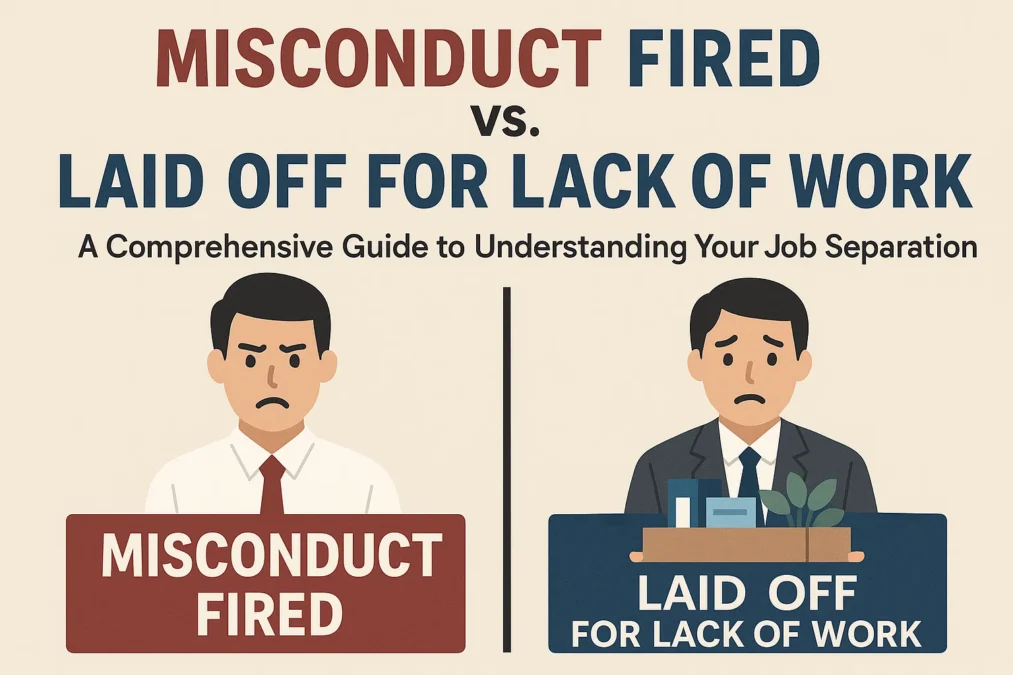Hearing the words “we have to let you go” is a moment of profound professional and personal impact. Your heart sinks, your mind races, and a flood of questions and emotions takes over. But in that critical moment, the reason behind your termination is the single most important factor that will shape your immediate future. The landscape of job separation is vast, but two paths stand in stark contrast: being fired for misconduct and being laid off due to a lack of work. These are not just different phrases; they are fundamentally different events with contrasting implications for your career trajectory, your financial stability, and your professional reputation.
Understanding the distinction between a misconduct fired vs. laid off lack of work situation is not merely an exercise in semantics. It is about knowing your rights, protecting your income through unemployment benefits, and crafting a narrative for your next career move. Many employees walk out of a termination meeting confused, hurt, and unsure of what just happened to them. Was it something they did? Was it a company-wide decision? The ambiguity can be paralyzing. This article aims to remove that ambiguity. We will dissect these two types of job separation, exploring the legal, financial, and professional consequences of each. We will guide you through what to do in either scenario, how to talk about it in future interviews, and how to turn a challenging situation into a stepping stone for your future success. Your journey after job loss depends heavily on understanding its origin.
Defining the Terms: What Does It Mean to Be Laid Off?
When we talk about a layoff, we are referring to a form of involuntary job separation that is typically not the employee’s fault. A layoff occurs when an employer eliminates a position or multiple positions for reasons related to the business’s operational needs, not because of the performance or behavior of the individual in that role. It’s a decision driven by macroeconomic factors, company restructuring, financial downturns, mergers, acquisitions, or the obsolescence of a particular role. Think of a layoff as a strategic business decision where the employee is, unfortunately, collateral damage.
The key characteristic of a layoff is its impersonality. You are not being let go because of who you are or what you did; you are being let go because the company has determined it no longer requires the function you performed, or it can no longer afford to fund that function. This is often described as a “reduction in force” (RIF). Layoffs frequently affect multiple employees at once, sometimes entire departments or divisions. You might be offered a severance package, and you are almost always eligible for unemployment insurance benefits because the separation is due to no fault of your own. The term “laid off” carries a much less stigmatizing connotation in the professional world, as it is widely understood to be a result of broader business conditions.
What Does It Mean to Be Fired for Misconduct?
Being fired, particularly for misconduct, sits on the opposite end of the spectrum. This type of termination is directly tied to the employee’s actions, behavior, or performance. It is a personal and specific decision made by the employer based on the individual’s failure to meet established standards. The term “misconduct” is a broad one, but it generally implies a willful or negligent disregard for the employer’s interests, policies, or reasonable expectations. Being fired is a direct consequence of your conduct on the job.
It’s helpful to break down misconduct into two categories: gross misconduct and simple misconduct. Gross misconduct refers to severe, often immediate, violations that irreparably damage the employment relationship. This includes theft, fraud, physical violence, serious harassment, showing up to work intoxicated, or egregious insubordination. In cases of gross misconduct, termination is usually immediate (“summary dismissal”), and the employee is often escorted from the premises. Simple misconduct, on the other hand, might involve repeated, lesser infractions despite warnings, such as chronic tardiness, excessive unexcused absences, or consistently failing to meet performance standards after being given an opportunity to improve. The critical element in a misconduct fired situation is culpability; the employer is asserting that the employee is at fault for the termination.
The Critical Differences Between Being Laid Off and Being Fired
The chasm between being laid off and being fired is wide, impacting everything from your immediate financial aid to your long-term career prospects. The most significant difference lies in the concept of fault. In a laid off lack of work scenario, the fault lies with the business situation—market forces, poor strategic planning, or economic recession. It is an external, non-personal failure. In a misconduct fired situation, the fault is placed squarely on the employee’s shoulders. This attribution of blame is the engine that drives all the other differing consequences.
From a legal and financial standpoint, this fault determination is paramount for unemployment benefits. State unemployment agencies exist to provide a safety net for workers who lose their jobs through no fault of their own. If you are laid off, you unequivocally meet this criterion. If you are fired for misconduct, the employer can contest your unemployment claim, arguing that you were terminated for cause. This can lead to a denial of benefits, cutting off a crucial financial lifeline. Furthermore, when you are laid off, you may be able to negotiate severance pay, continued health insurance via COBRA, and even outplacement services. When you are fired for cause, these benefits are almost never offered.
Why the Reason for Your Departure Matters
You might be thinking, “A job loss is a job loss; why does the label matter so much?” The reason matters because it sets the narrative for the next chapter of your professional life. For future employers, the distinction between a misconduct fired vs. laid off lack of work explanation is significant. A layoff is a straightforward, easily understood event that doesn’t raise red flags about your character or capabilities. It allows you to present your departure as a business decision, not a reflection of your personal performance.
Conversely, being fired for misconduct creates a much more challenging narrative. A new employer will naturally be concerned about your judgment, reliability, and ability to function within a team. It raises immediate questions: “Is this candidate a risk to our company culture?” “Will they repeat the behavior that got them fired?” This doesn’t mean you can never recover from being fired, but it does mean you have a much steeper hill to climb. The reason for your departure also matters for your own sense of self. A layoff, while painful, does not have to be a blow to your self-esteem. Being fired for misconduct often comes with feelings of shame, guilt, and failure that require active processing and reframing to overcome.
The Legal and Financial Implications of Each
The legal and financial fallout from these two types of separation could not be more different. When you are part of a laid off lack of work initiative, your legal rights often hinge on ensuring the layoff was conducted fairly and without discrimination. For example, if a layoff disproportionately affects employees of a certain age, race, or gender, it could form the basis of a discrimination lawsuit. You also have a strong, and usually uncontested, claim for unemployment benefits. Financially, you may receive a severance package, which is often based on your tenure with the company, and you may have the option to exercise stock options or roll over your 401(k).
When you are fired for misconduct, the legal landscape is more defensive. The employer must have sufficient documentation and evidence to support their claim of misconduct to successfully contest your unemployment claim. If they cannot prove their case, you may still receive benefits. In cases of alleged gross misconduct, if you believe the termination was wrongful—for instance, if it was in retaliation for you reporting illegal activity (whistleblowing) or was based on discriminatory grounds—you may have grounds for a wrongful termination lawsuit. However, these cases are difficult and expensive to prove. Financially, you should expect no severance pay, and your access to company benefits will cease immediately, often without the subsidized bridge of COBRA that sometimes accompanies a layoff.
Lawyer vs Attorney: Unraveling the Confusion and Choosing Your Legal Champion
How to Handle a Layoff Situation
Being laid off is a jarring experience, but how you handle the immediate aftermath can set a positive tone for your transition. First, during the termination meeting, stay calm and professional. Listen carefully to what is being said. Ask about the specific reason for the layoff—is it part of a larger reduction in force? Ask about the details of your final paycheck, severance package (if any), vacation payouts, and health insurance coverage. Get everything in writing. Do not sign any documents on the spot, especially if they include a release of claims or a confidentiality agreement. It is perfectly reasonable to ask for time to review these documents with an attorney.
Once the initial shock has passed, your first practical step should be to file for unemployment benefits. Do not delay; the process can take time. The lack of work reason for your separation is your key to unlocking this assistance. Next, carefully review any severance agreement you are offered. These agreements are almost always written in the company’s favor, but they may be negotiable, especially concerning the amount of severance pay or the duration of extended health benefits. Use this period to take a breath. A layoff, while stressful, is also an opportunity to reassess your career goals, update your resume, and begin a strategic job search. Remember, a layoff is a business decision, not a personal failure.
How to Handle Being Fired for Misconduct
The emotional impact of being fired, especially for a reason like misconduct, can be devastating. Your first instinct might be to argue, get angry, or shut down. However, the most important thing you can do in the termination meeting is to listen and remain as composed as possible. Do not get into a heated debate or admit to anything you are not sure about. Ask for a clear, written explanation of the reasons for your termination. Understand what will be said to prospective employers who call for a reference. In many cases, companies will only confirm your dates of employment and job title to avoid defamation lawsuits, but it’s crucial to know their official policy.
After the meeting, it’s time for a period of honest self-reflection. This is difficult but necessary. Even if you feel the termination was unfair, try to objectively assess what happened. What was the specific misconduct cited? Was it a single event or a pattern of behavior? Were there warnings you ignored? This is not about assigning blame, but about understanding the dynamics so you can learn and grow from the experience. Your next step is to immediately apply for unemployment benefits. Be aware that your former employer will likely contest the claim, and you may have to go through an appeals process where you will need to present your side of the story. Be honest and factual in your appeal.
Explaining Your Departure in Future Job Interviews
This is perhaps the most daunting part of any job loss: how to talk about it in your next interview. The approach varies dramatically depending on whether you were laid off or fired. For a laid off lack of work situation, your explanation can be simple, direct, and confident. You can say something like, “Unfortunately, my position was eliminated as part of a company-wide restructuring,” or “The company underwent a significant reduction in force, and my department was affected.” This is a clean, professional, and widely accepted reason for job separation. You can then quickly pivot the conversation to your accomplishments in that role and your excitement about the new opportunity.
Explaining a misconduct fired situation is far more delicate and requires a carefully considered strategy. The worst thing you can do is lie. Instead, you must prepare a brief, honest, and forward-looking statement. Avoid bad-mouthing your previous employer or getting into a lengthy, defensive story. Acknowledge the situation, take responsibility, demonstrate what you learned, and show how you have grown. For example, you could say, “I made a mistake at my previous job regarding [the specific issue]. It was a significant learning experience for me, and I have taken time to reflect on what happened. I now have a much deeper understanding of the importance of [policy, professionalism, communication, etc.], and I am committed to applying those lessons in my next role.” The goal is to show maturity, self-awareness, and growth, turning a negative into a demonstration of your character.
Protecting Your Professional Reputation
In today’s digitally connected world, your professional reputation is one of your most valuable assets. After any job separation, it’s crucial to manage it proactively. After a layoff, this is relatively straightforward. You can update your LinkedIn profile with a clear, positive statement. For instance, “After [X] years at [Company], my position was unfortunately eliminated due to a restructuring. I’m incredibly proud of the work I did [list a key achievement] and am now excited to explore new opportunities in [your field].” This frames the layoff as an external event and immediately signals to your network that you are on the job market.
After being fired, reputation management requires more finesse. Do not vent your frustrations on social media. This can only harm you. It’s best to be more circumspect in your public profile. You do not need to announce on LinkedIn that you were fired. Simply list your dates of employment. When networking, you do not need to lead with the fact that you were fired. Focus on your skills and what you are looking for next. Your detailed explanation should be reserved for serious interviews once you have a chance to contextualize it in person. Reconnect with trusted former colleagues and managers who can vouch for your overall character and work ethic, which can help counteract the negative mark of a termination.
The Emotional Toll and How to Recover
Job loss is a major life stressor, ranked alongside divorce and the death of a loved one. However, the emotional and psychological impact differs between a layoff and a firing. A laid off lack of work event often triggers feelings of shock, betrayal, and anxiety about the future. Your sense of security is shattered. However, because it is not a personal failure, it typically does not carry the same heavy burden of shame. The primary emotion is often fear—fear of financial ruin, fear of not finding a new job.
Being fired for misconduct injects a powerful cocktail of additional emotions: deep shame, guilt, anger, and a profound blow to your self-esteem. You may feel isolated and believe that your entire career is ruined. The path to recovery begins with acknowledging these feelings rather than suppressing them. Talk to a trusted friend, family member, or therapist. Separate your identity from the event; you are not a “bad employee,” you are a person who made a mistake or was in a situation that didn’t work out. Use the experience as a catalyst for personal and professional development. Identify the skills or emotional intelligence you need to develop to ensure it doesn’t happen again. Practice self-compassion. Everyone makes errors in judgment; what defines you is not the mistake, but how you respond to it and learn from it.
A Side-by-Side Comparison
To crystallize the key distinctions, the following table provides a clear, side-by-side comparison of a termination for misconduct fired versus a laid off lack of work scenario.
| Aspect | Misconduct Fired | Laid Off for Lack of Work |
|---|---|---|
| Primary Reason | Employee’s fault: performance, behavior, or violation of policy. | Company’s fault: restructuring, financial problems, merger. |
| Eligibility for Unemployment | Often denied, especially for gross misconduct. Employer will likely contest the claim. | Almost always approved, as separation is through no fault of the employee. |
| Severance Package | Very rarely offered. | Commonly offered, especially in larger companies. |
| Professional Stigma | High. Raises red flags for future employers about judgment and reliability. | Low. Seen as a standard business practice with no reflection on the employee. |
| Legal Implications | Potential for wrongful termination lawsuit if based on discrimination or retaliation. | Potential for discrimination lawsuit if the layoff process was biased. |
| Future Reference Checks | Company may state “not eligible for rehire,” which is a significant red flag. | Company will typically confirm dates and title, with a neutral stance. |
| Best Explanation in Interviews | Brief, honest, focused on lessons learned and personal growth. | Simple, factual statement about company downsizing or restructuring. |
Wisdom from the Workplace
Sometimes, the best insights come from those who have experienced or overseen these situations. Here are a few quotes that capture the essence of these two types of job separation.
A seasoned HR Director reflects on the difference: “When I have to lay someone off, it’s a somber day. I’m ending a role, not judging a person. When I have to fire someone for misconduct, it’s a day of accountability. The emotional weight and the procedural rigor are entirely different in each case.”
A tech professional who was laid off shared this perspective: “Being laid off felt like my train had been canceled. It was frustrating and scary, but I knew it wasn’t because I was a bad passenger. It just meant I had to find a new route to my destination.”
Another professional who was fired earlier in their career offered this hard-won advice: “Getting fired was the lowest point of my career, but it was also the catalyst I needed. It forced me to confront my own shortcomings and fundamentally change my approach to work and professionalism. I wouldn’t be where I am today without that painful lesson.”
Frequently Asked Questions
Can I collect unemployment if I was fired for misconduct?
It depends on the severity of the misconduct. Each state’s unemployment agency has its own definitions. Generally, if you were fired for “gross misconduct” (e.g., theft, violence), you will almost certainly be denied benefits. However, if it was for “simple misconduct” (e.g., chronic lateness, poor performance), you may still be eligible after a disqualification period. You should always apply, because the employer bears the burden of proving the misconduct to the agency. If your claim is denied, you have the right to appeal the decision.
What should I do if I believe I was wrongfully fired?
If you believe you were fired due to discrimination (based on race, gender, age, disability, etc.), in retaliation for whistleblowing, or for another illegal reason, you should consult with an employment attorney immediately. Do not sign any severance or release documents from your employer before doing so. Gather any evidence you have that supports your claim, such as emails, performance reviews that contradict the reason for termination, or witness statements. Wrongful termination cases are complex, but an attorney can advise you on the strength of your case and your potential legal options.
How long does a termination for misconduct stay on my record?
There is no single “permanent record” that employers check. The “record” is primarily what your former employer keeps in its own files and what it is willing to disclose during a reference check. Many companies have a policy of only confirming dates of employment, job title, and sometimes salary to avoid liability. However, they may also state that you are “not eligible for rehire,” which is a clear indicator of a problematic separation. The practical impact of a termination fades over time, especially if you can demonstrate a pattern of positive employment afterward.
Is it better to quit than to be fired?
Generally, no. Quitting voluntarily makes you almost universally ineligible for unemployment benefits. If you are facing a likely termination for performance or minor misconduct, it can be tempting to quit first. However, by doing so, you are giving up your potential right to contest the termination and claim unemployment. It is almost always better to let the employer terminate you, unless you have another job already lined up. The one exception might be if you are in a high-level position where the public perception of being fired could be uniquely damaging, and you have the financial means to weather a period without income or benefits.
What is the key difference between a furlough and a layoff?
A furlough is a temporary, unpaid leave of absence with the expectation that you will be called back to work after a specific period or when business conditions improve. Your employment relationship is technically still intact, and you often retain your health benefits during the furlough. A layoff is a permanent termination of the employment relationship due to a lack of work. While sometimes a “temporary layoff” can become permanent, the key distinction is intent: a furlough is designed to be temporary, while a layoff is a permanent separation.
Conclusion Misconduct Fired vs. Laid Off
Navigating the end of an employment relationship is one of the most challenging professional experiences you can face. However, as we have explored, not all job separations are created equal. The divide between being fired for misconduct and being laid off for lack of work is profound, influencing your financial safety net, your legal standing, your professional reputation, and your psychological well-being. A layoff, while disruptive, is a reflection of business circumstances. Being fired is a reflection of a breakdown in the employment relationship, often rooted in your individual conduct or performance.
Armed with this knowledge, you can approach either situation with greater clarity and purpose. If you are laid off, you can confidently access the support systems designed for you and frame your departure positively for future opportunities. If you are fired, you can engage in the difficult but necessary work of self-assessment, fight for your unemployment rights if appropriate, and craft a narrative of growth and redemption for your career journey. Remember, a job loss does not define you. Your resilience, your response, and your ability to learn from the experience are what truly shape your future success. Understand the difference, know your rights, and take the next step forward with confidence.



